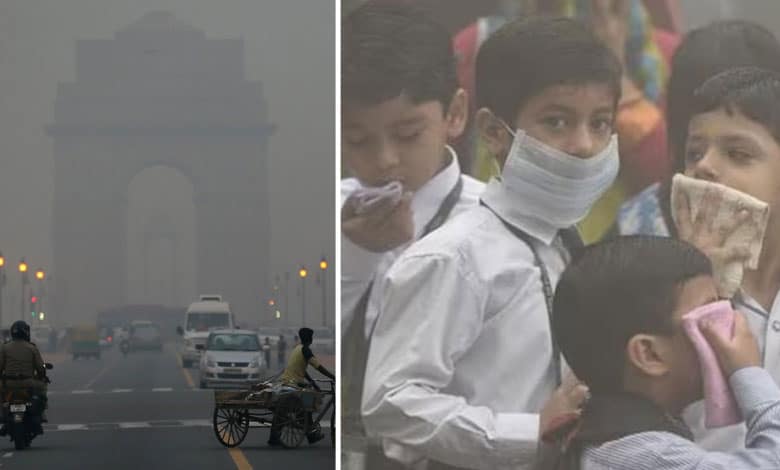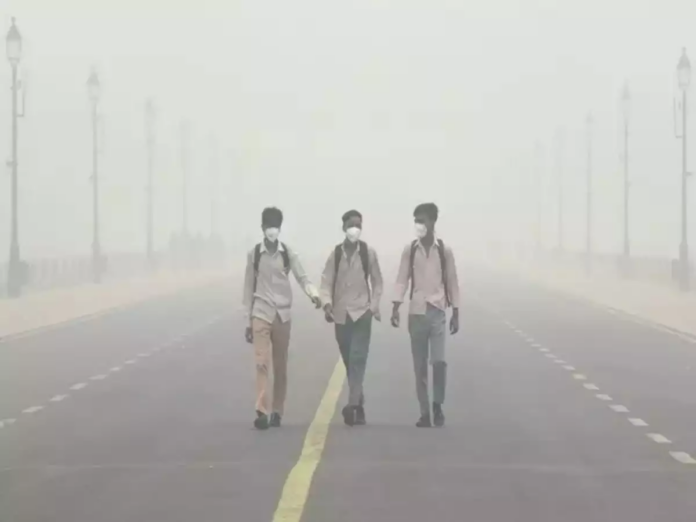Delhi Government Suspends Physical Classes For Board Students
In an unprecedented move, the Delhi Government announced the suspension of physical classes for students of Classes 10 and 12 on Monday. This decision extends the earlier directive shifting all other grades to an online education format, citing alarmingly high pollution levels across the National Capital Region (NCR). The announcement comes on the heels of a Supreme Court order, urging swift measures to safeguard students’ health amidst worsening air quality.
Supreme Court Pushes For Immediate Action
The Supreme Court’s directive on Monday acted as a catalyst for the Delhi Government’s decision. The apex court emphasized the need to halt all physical education activities for students, particularly for board exam candidates, until the air quality situation shows signs of improvement. This intervention highlights growing concerns about the health hazards posed by the severe smog engulfing the region.

Severe Pollution Forces Drastic Measures
Delhi’s Air Quality Index (AQI) has remained in the “severe” category for several consecutive days, exacerbated by factors such as vehicular emissions, stubble burning, and industrial pollutants. The toxic smog has prompted schools to implement remote learning, a step seen as essential to minimizing exposure to hazardous air, especially for vulnerable groups like children.
Impact On Board Exam Preparation
The sudden shift to online classes has sparked mixed reactions from students and parents, particularly for those preparing for crucial board examinations. Many are concerned about the lack of face-to-face interaction with teachers, potentially hindering their exam readiness. However, health experts and educators emphasize that prioritizing student safety is paramount.
Online Learning Gains Prominence Amid Crisis
With physical classrooms off the table, schools have ramped up their online learning infrastructure. Teachers are utilizing digital platforms to conduct virtual lessons, share resources, and monitor students’ progress. While some schools in Delhi NCR were already equipped to handle this transition, others are scrambling to ensure that the shift does not disrupt the academic calendar.
Parents And Students React To The Announcement
Parents have expressed relief at the decision to move classes online, given the dire health implications of the current air quality. However, concerns linger about the effectiveness of virtual learning, particularly for younger students who struggle to stay engaged in digital classrooms.
“I am glad that the government has prioritized health, but managing online classes for my two children is not easy,” said Priya Mehra, a parent from South Delhi.
On the other hand, students preparing for board exams feel the pressure of adapting to a different learning format so close to their examinations. “We are already stressed about our studies, and now this adds to the anxiety,” said Arjun Singh, a Class 12 student.

Schools Seek Support To Enhance Digital Infrastructure
Educational institutions have called for government support to enhance digital learning resources and ensure equal access to quality education. The move to online learning has highlighted the digital divide, with many students lacking the devices or internet connectivity required to attend virtual classes.
“Shifting online is a necessary step, but we need to ensure that no child is left behind due to technical or financial barriers,” said a principal from a government school in East Delhi.
Health Experts Warn Of Long-Term Risks
Health experts warn that prolonged exposure to Delhi’s hazardous air could have severe long-term effects on children, including respiratory issues, weakened immunity, and reduced lung capacity. The suspension of physical classes is seen as a preventive measure to reduce these risks.
“The AQI levels are alarmingly high, and children are among the most vulnerable groups. Keeping them indoors is the best option for now,” said Dr. Anil Sharma, a pulmonologist at AIIMS.
Broader Implications For Policy And Infrastructure
The ongoing crisis has reignited debates about the need for stronger pollution control policies in Delhi NCR. Activists and citizens have called for urgent action to address root causes such as industrial emissions and vehicular pollution. The temporary suspension of physical classes highlights the broader need for long-term solutions to safeguard public health.
As Delhi grapples with its annual air pollution crisis, the decision to shift education online underscores the urgent need for systemic changes to ensure a healthier future for the city’s children.

